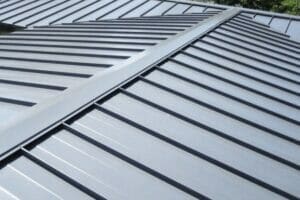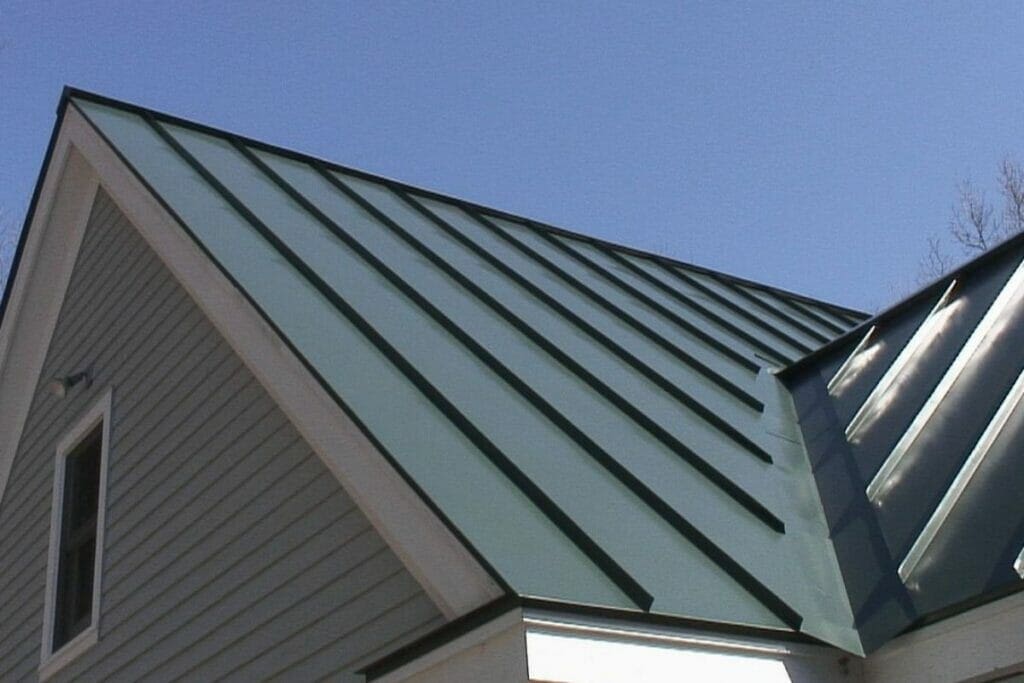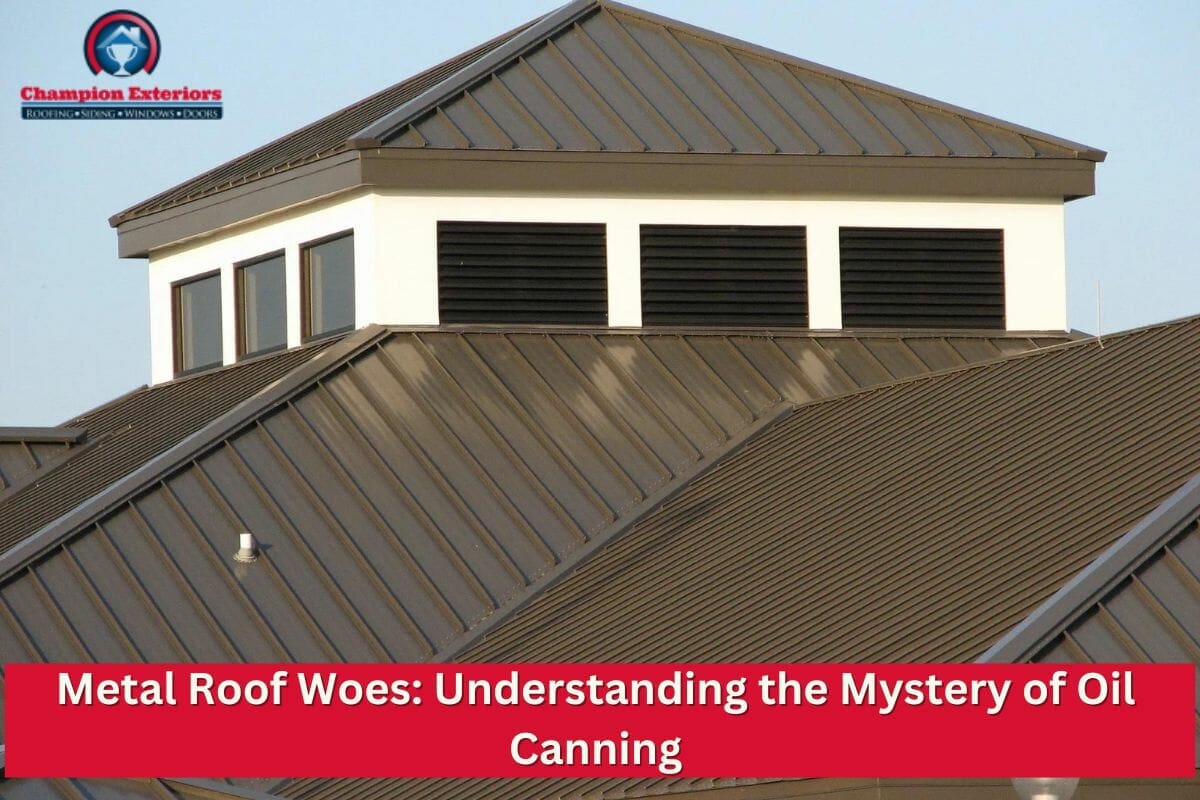If you’re a homeowner considering a metal roof for your home, you might have heard the term oil canning. It’s a phenomenon that can occur on metal roofs and can be a cause for concern. In this comprehensive guide, we will delve into everything you need to know about oil canning on metal roofs, including what it is, its causes, its effects, and, most importantly, how to prevent it from happening.
What Is Oil Canning?
Characterized by visible waves, ripples, or buckling, oil canning is a visual distortion that affects flat metal panels used in roofing and wall applications. This phenomenon is commonly found in cold-rolled metal products such as steel, copper, zinc, and aluminum. Oil canning is an inherent characteristic of metal panels and is primarily an aesthetic issue rather than a structural concern.
The appearance of oil canning can vary depending on factors such as lighting conditions, the angle of view, and the color or finish of the metal panels. It is important to note that oil canning does not affect the performance or functionality of the metal roof. Again, it is purely a cosmetic concern.
Causes Of Oil Canning
By understanding the causes of oil canning you can prevent it from occurring on your metal roof. While the exact root cause can be difficult to determine, the following factors can contribute to the development of oil canning on metal roofs. This section explores some of the most common causes:

1. Stresses During The Production Process
Oil canning occurs as a result of uneven stresses during the milling process of metal panels. This can be caused by factors such as deviations in the mill rollers or improper distribution of stress.
2. Uneven Roof Deck
An uneven substrate or roof deck can also lead to oil canning. When installed over an uneven surface, the metal panels can cause slight contours and lead to visible distortion.
3. Improper Installation
Poor installation practices, such as overdriving fasteners, using incorrect clip systems, or misaligning the panels, can result in uneven stresses that contribute to oil canning.
4. Thermal Expansion And Contraction
Any roofing material is prone to thermal expansion and contraction, and metal panels are no exception. During installation, your contractor should keep this in mind, as neglecting it will cause excess stress on the roof and can lead to metal roof oil canning.
5. Improper Handling or Storing
Mishandling or improper storage of metal panels can also contribute to oil canning. Panels should always be carried perpendicular to the ground and properly supported to prevent bending or warping.
6. Issues With the Rolling Process During Manufacturing
Problems with the rolling process, such as poorly adjusted or worn roll formers, can introduce distortions that can lead to oil canning.
Read More: How Long Does A Metal Roof Last?
Effects Of Oil Canning On Metal Roofs
Oil canning is primarily an aesthetic issue, meaning it can have some effects on the overall appearance and perception of a metal roof. Some potential impacts include:
1. Diminished Visual Appeal
The visible waves or buckling caused by oil canning can detract from the smooth and sleek appearance of the metal roof, potentially impacting its overall aesthetic appeal.
Perception of Poor Quality
Homeowners and observers may mistakenly perceive oil canning as a sign of poor quality or faulty installation, despite it being common in metal roofing systems.
Inconsistent Light Reflection
Oil canning can cause variations in how light reflects off the metal surface, resulting in an uneven or inconsistent appearance.
Potential For Increased Maintenance
Although oil canning does not affect the performance of the metal roof, homeowners may feel compelled to address the aesthetic issue by seeking repairs or maintenance, which can result in unnecessary expenses.
It’s important to note that the effects of oil canning can vary depending on factors such as the severity of the distortion, the color or finish of the metal panels, and the overall design and architecture of the building.
How To Prevent Metal Roof Oil Canning

While it may not be possible to eliminate the risk of oil canning, there are several measures you can take to minimize its occurrence. Here are some effective strategies for preventing oil canning on metal roofs:
1. Proper Panel Selection
Choose metal panels that are designed to minimize oil canning. Some manufacturers offer panels with striations, minor ribs, or planks that help reduce the visibility of oil canning. Consult with a reputable metal roofing supplier to explore these options.
2. Panel Width Considerations
Opt for narrower panel widths, as oil canning is more visible in broader, flat areas. Thinner panels can help distribute stress more evenly and minimize the appearance of oil canning.
3. Professional Installation
Hire experienced and knowledgeable installers with expertise in metal roofing installation. Proper alignment, careful measurements, and attention to detail during installation can significantly reduce the chances of oil canning.
4. Correct Fastener Installation
Follow the manufacturer’s guidelines for fastener installation, ensuring that they are not overdriven or angled incorrectly. Properly installed fasteners help maintain even stress distribution across the metal panels.
5. Consider Thermal Movement
Allow for proper thermal expansion and contraction of the metal panels by providing adequate space for movement during installation. This can help minimize the risk of oil canning caused by temperature fluctuations.
6. Proper Handling and Storage
Handle metal panels carefully, transporting them safely and providing support to prevent bending or warping. Follow the manufacturer’s instructions for proper storage to prevent unnecessary stress on the panels.
7. Choose Low Gloss or Textured Finishes
Opt for low gloss or textured finishes, as they can help minimize the visibility of oil canning by reducing the reflective properties of the metal surface.
8. Consult With A Metal Roofing Professional
If you have concerns about oil canning or want to explore additional preventive measures, consult a reputable metal roofing professional who can provide expert guidance and recommendations based on your specific project requirements.
Implementing these preventive measures can significantly reduce the risk of oil canning on your metal roof and ensure a visually appealing and long-lasting roofing system.
Conclusion
Oil canning is common in metal roofs, but it does not have to be a cause for concern. By understanding what oil canning is, its causes, effects, and prevention methods, homeowners can make informed decisions when it comes to choosing and installing a metal roof. Working with reputable manufacturers and experienced installers is key to minimizing the risk of oil canning and ensuring a visually appealing and long-lasting metal roof. Remember, oil canning is primarily a cosmetic issue, and with proper preventive measures, you can enjoy all the benefits a metal roof offers.
Do You Want To Be Free From The Fear Of Metal Roof Oil Canning?
Do you want to install a metal roof that stays free from problems like oil canning? While oil canning on metal roofs results from many factors, poor installation is the top cause. Faulty installation can lead to minor issues, like oil canning, and major problems that break the bank. By hiring a trusted and reputable roofing company in New Jersey, you can be sure your metal roof is installed properly the first time. Consider Champion Exteriors and call their expert roofers today at (609) 845-3576.
Frequently Asked Questions about Oil Canning on Metal Roofs
A. No, oil canning is not indicative of a defective metal roof. It is an inherent characteristic of metal panels and does not affect the structural integrity or performance of the roof.
A. In most cases, oil canning cannot be fully fixed or repaired. It is primarily an aesthetic issue, and attempts to address it may result in unnecessary expenses and potential damage to the metal panels.
A. Oil canning is typically not covered under warranties as it is considered a cosmetic problem rather than a structural defect. Reviewing the warranty terms and conditions provided by the manufacturer is always advisable.
A. Yes, oil canning can occur on various types of metal roofs, including standing seam roofs, corrugated roofs, and flat panel roofs. However, the visibility and severity of oil canning may vary depending on the specific design and characteristics of the metal roof.
A. While it may not be possible to completely prevent oil canning, following proper installation practices, selecting appropriate panel options, and considering factors such as panel width and finish can significantly minimize its occurrence.
A. Oil canning is typically not covered by insurance as it is not a material defect or damage to the roof. However, it is advisable to consult with your insurance provider to understand the specific terms and coverage related to your metal roof.


